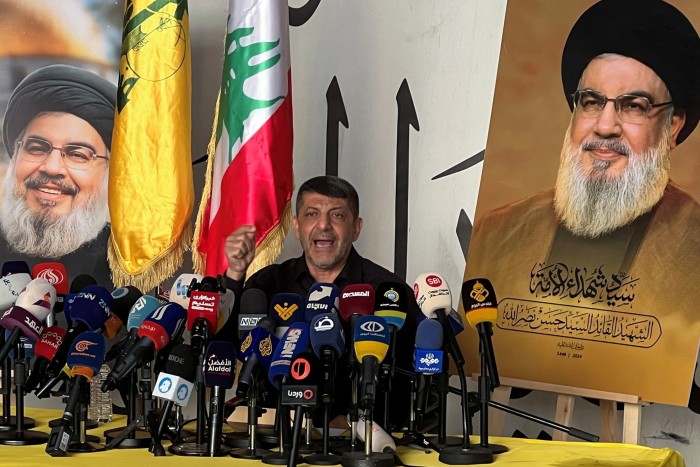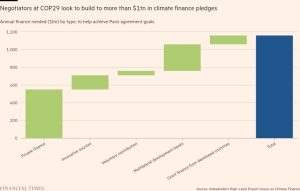Talks over Israel-Hizbollah deal make ‘progress’, says new foreign minister

Unlock the Editor’s Digest for free
Roula Khalaf, Editor of the FT, selects her favourite stories in this weekly newsletter.
Israel’s new foreign minister said on Monday that there had been “progress” in efforts to reach an agreement to end the war between Israeli forces and Hizbollah in Lebanon.
Last month, US officials presented a draft plan to end the fighting that called for an initial 60-day ceasefire and the withdrawal of the Lebanese militant group and Israeli troops from southern Lebanon.
But Israeli officials have said that they will insist on the right to unilaterally “enforce” any agreement that ends the war — a stance that Lebanese government officials have rejected.
In a press conference in Jerusalem on Monday, Gideon Sa’ar said that Israel was “working with the US” and that “there is progress” towards a ceasefire.
“We will be ready to be there if we know, first of all, that Hizbollah is not on our border . . . and that Hizbollah will not be able to arm [itself] again with new weapons systems,” said Sa’ar.
Hizbollah downplayed the prospect of a breakthrough, however. An official acknowledged the renewed diplomatic push but said neither the militant group nor the Lebanese state had received a tangible new proposal.
“There is a difficult political climate . . . given Donald Trump’s ascendancy to the US presidency,” said Mohammad Afif, head of Hizbollah’s media relations office, in a press conference.
“So there is a great movement between Washington and Moscow and Tehran and a number of capitals,” Afif said. “I believe that we are still in the phase of testing the waters and presenting initial ideas and proactive discussions, but so far there is nothing actual yet.”

The US-led proposal presented in October would give Israeli forces the right to target Hizbollah in “self-defence against imminent threats to Israel” and allow its warplanes to continue flying over Lebanon for “intelligence, surveillance and reconnaissance” to ensure that Hizbollah “cannot reconstitute” in the country’s south.
People familiar with Lebanese government thinking said those terms were unacceptable, as they would violate Lebanon’s sovereignty and would mark a capitulation to Israel, which they blame for holding up ceasefire talks.
Hizbollah has said it would not agree to a ceasefire in Lebanon as long as Israeli troops are fighting in Gaza. But Lebanese government officials said the militant group had previously accepted the terms of an ultimately unsuccessful 21-day ceasefire proposal in September.
Sa’ar said on Monday that “the main challenge eventually will be to enforce what will be agreed”.
Israel’s military chief Herzi Halevi said last week that the country’s armed forces were considering “deepening” their ground offensive in southern Lebanon.
But a person briefed on the situation said Israeli officials were worried about the mounting criticism from the US over the humanitarian conditions in Gaza, and that they could try to use a deal in Lebanon to ease some of the international pressure on Israel.
The person suggested the conflict in Lebanon could “be resolved sooner rather than later because that is an easier front to resolve” than Gaza.
Sa’ar hinted that Russia could play a role in facilitating a ceasefire. Russia and Iran are key allies of the regime in Syria, through which many of Hizbollah’s weapons are transported.
Asked about a visit last week to Moscow by Ron Dermer, Israel’s minister of strategic affairs and one of the closest advisers to Prime Minister Benjamin Netanyahu, Sa’ar said preventing Hizbollah from rearming would be “vital to the success of any arrangement in Lebanon”.
#Talks #IsraelHizbollah #deal #progress #foreign #minister







